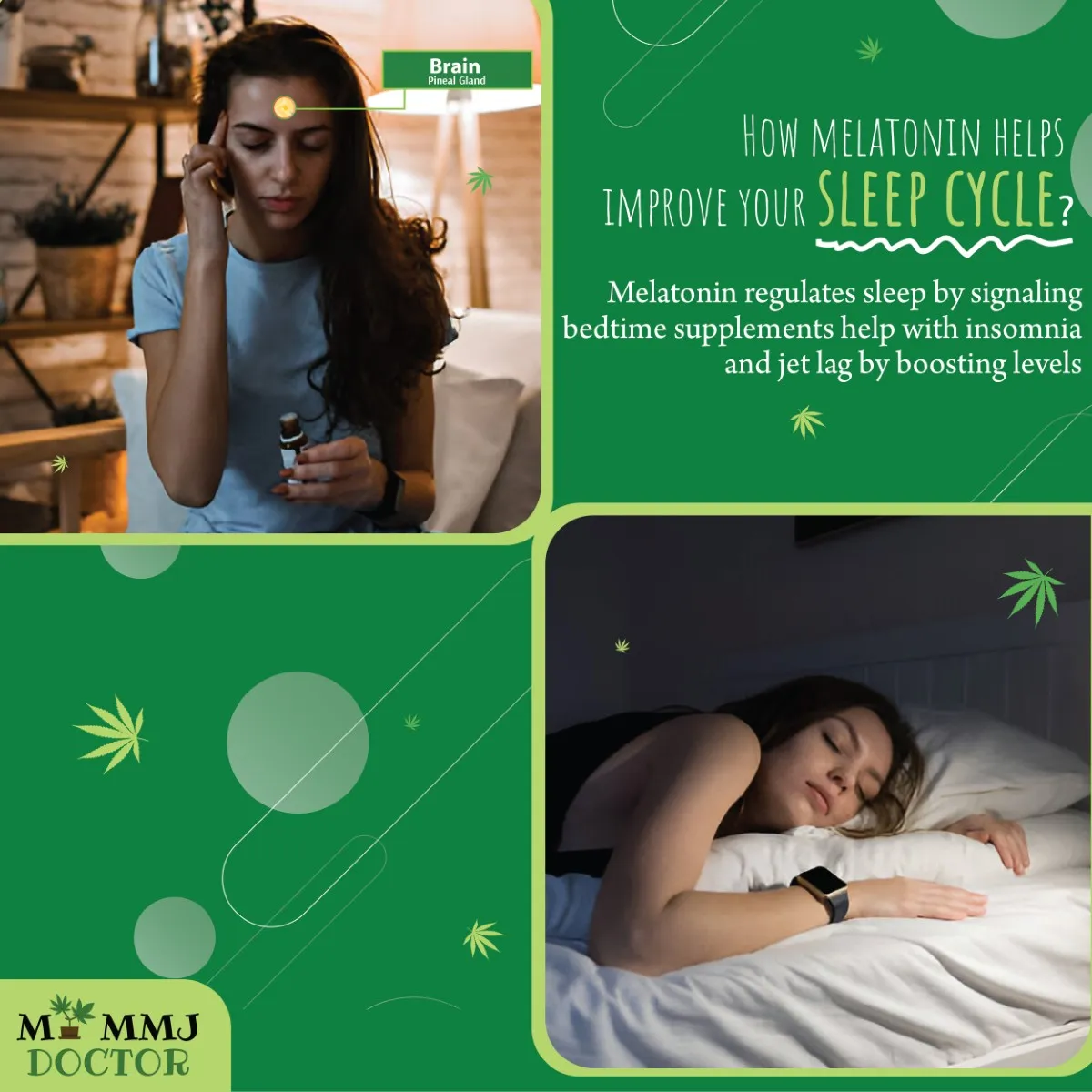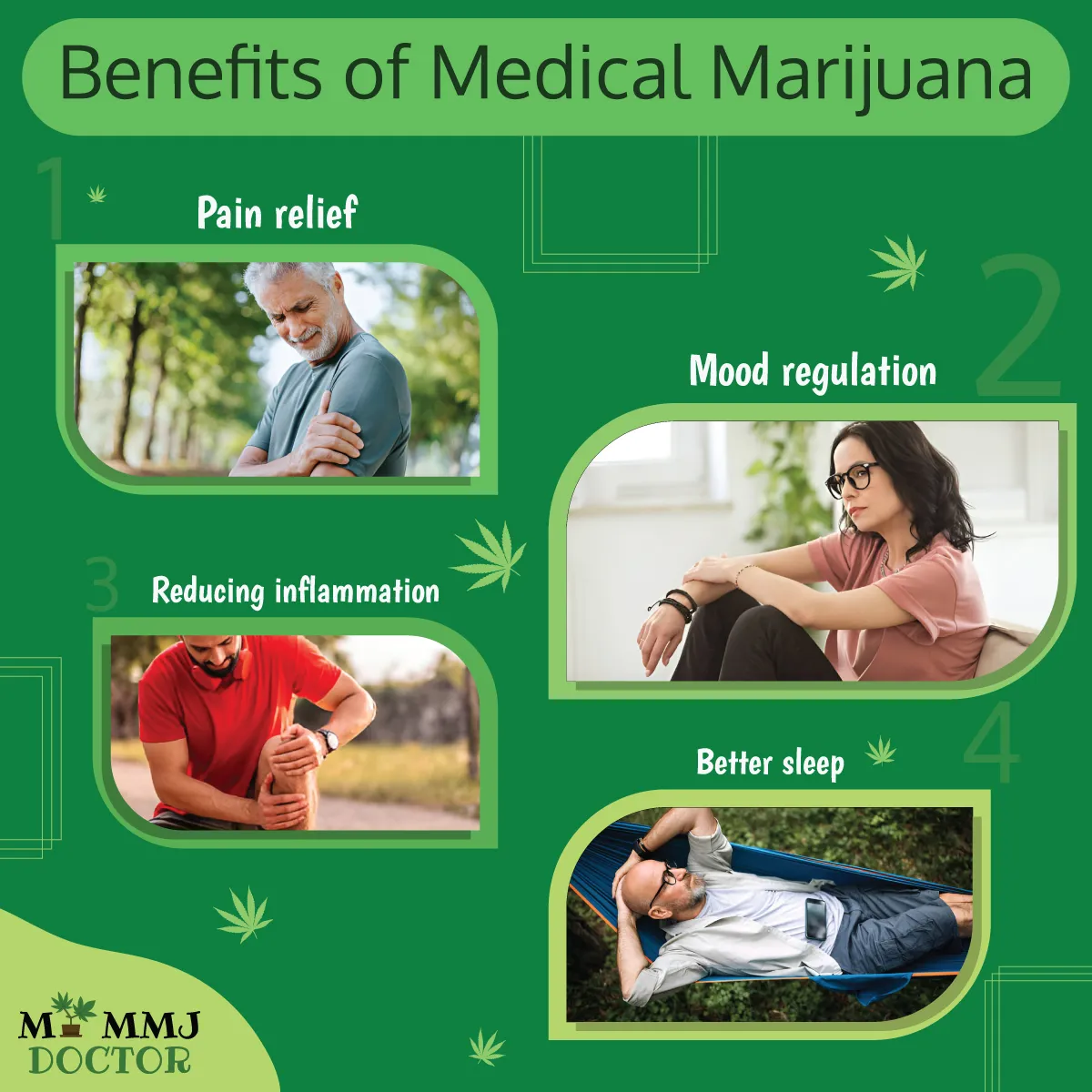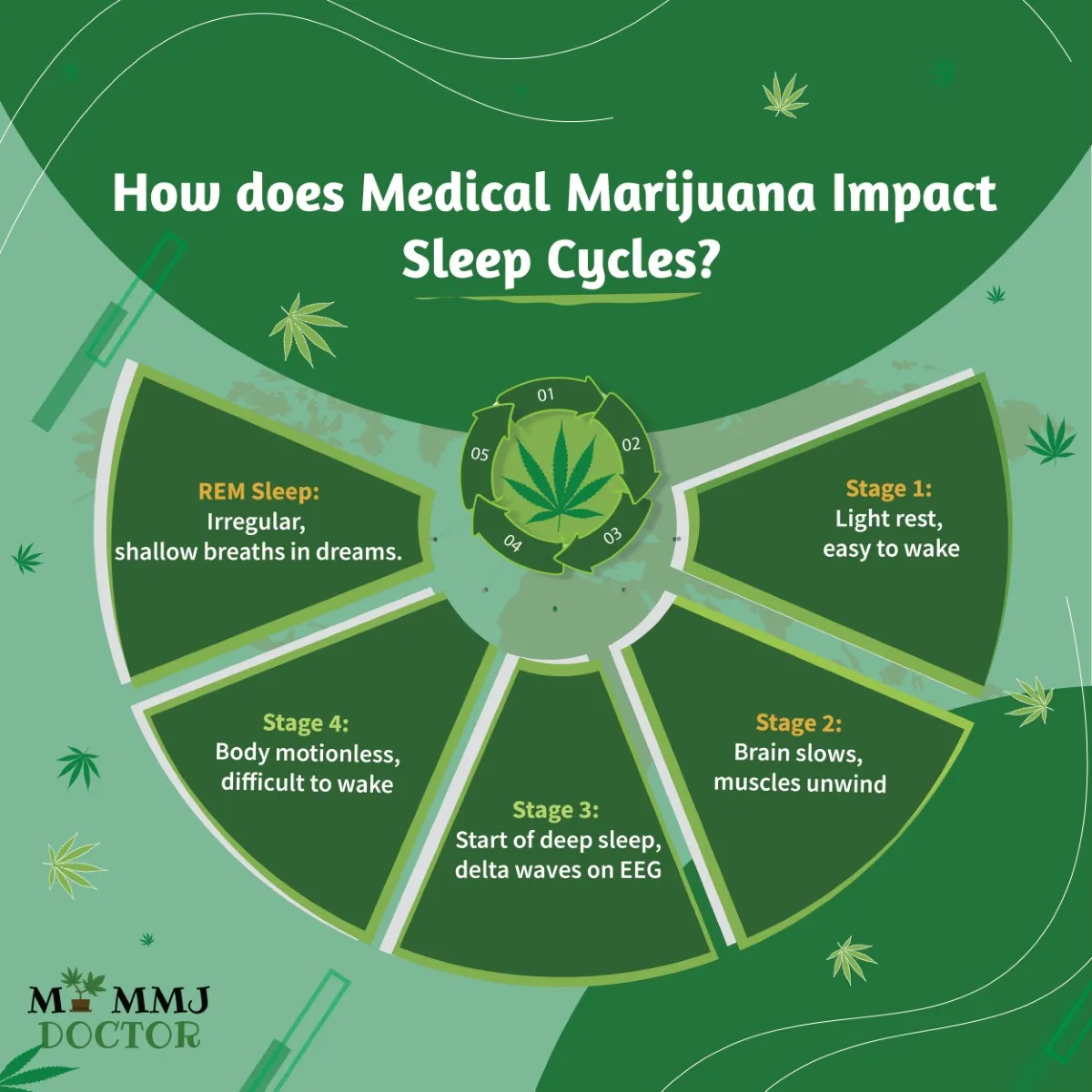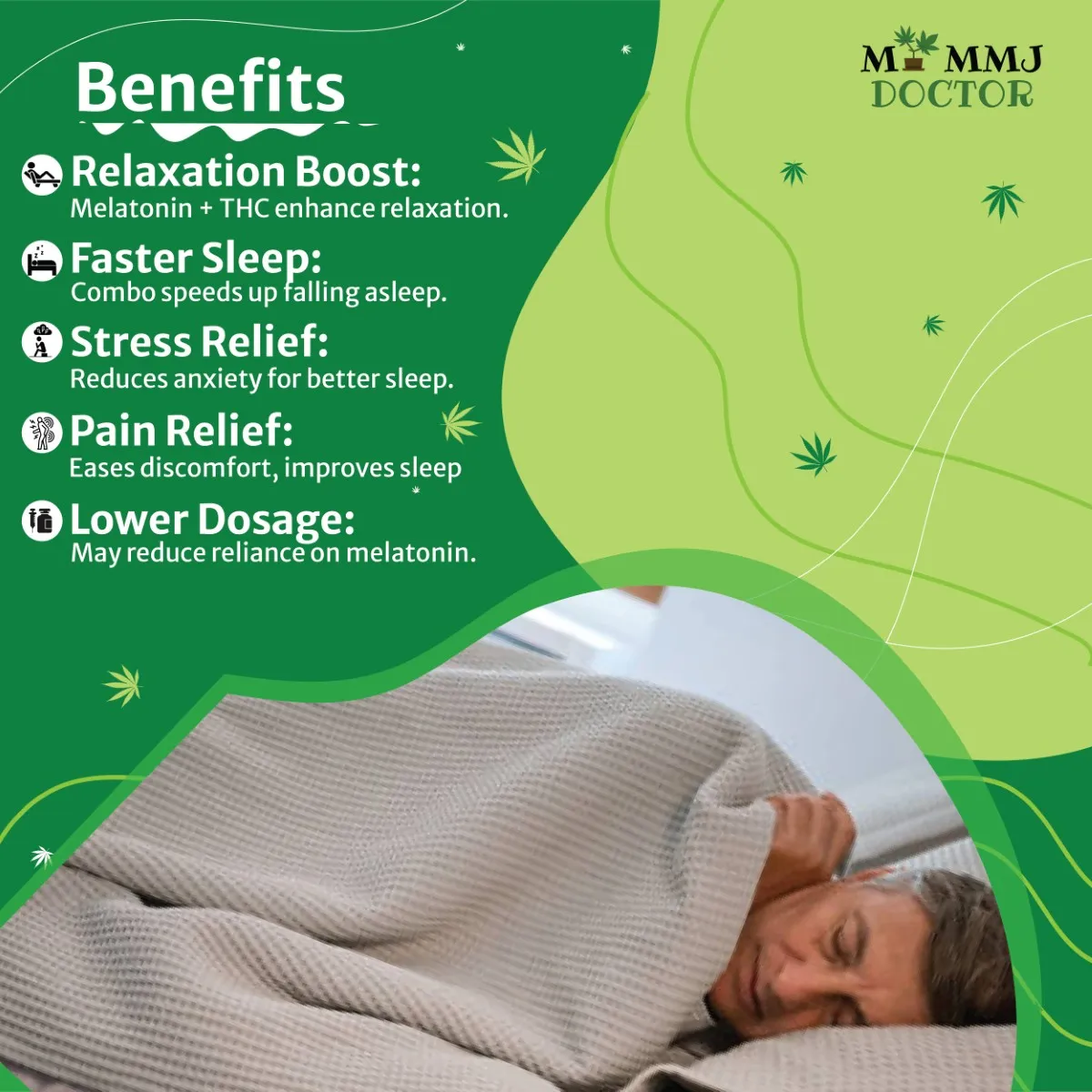Is It Safe to Combine Melatonin and Cannabis?

You’re lying in bed, tossing and turning, unable to fall asleep as your mind races with tomorrow’s responsibilities. It’s a frustrating experience many of us can relate to. In search of relief, some people turn to sleep aids like melatonin or medical marijuana to help them drift off. Melatonin, available in various forms like gummies, drinks, and pills, is a popular over-the-counter remedy for improving sleep. Meanwhile, with medical marijuana becoming legal in many areas of the United States, cannabis-based edibles containing THC are also gaining attention as sleep aids.
But how do these substances affect your sleep, and what happens if you mix them? In this blog, you will get to know the science behind melatonin, and medical marijuana, and their impact on your sleep cycle to help you make right choices.

What is Melatonin and How Do Melatonin Supplements Help with Sleep?
It helps in maintaining your circadian rhythm, ensuring you sleep better at night. People with light perception issues, like those who are blind, may experience irregular melatonin production, which can disrupt their circadian rhythm and lead to sleep disorders or trouble maintaining a consistent sleep pattern.
How it Works?
However, certain factors like aging, caffeine, alcohol, shift work, exposure to blue light from electronic devices, and some medications can lower melatonin production, making it harder to fall asleep.
How Melatonin Supplements Help?
- Melatonin supplements can help restore low melatonin levels, making it easier to fall asleep.
- Research shows melatonin can reduce the time it takes to fall asleep and increase overall sleep duration.
- Melatonin is also useful for jet lag or adjusting to a new sleep schedule, especially for shift workers.
Before taking melatonin, it’s a good idea to try healthy sleep habits like limiting blue light exposure, sticking to a sleep routine, and avoiding caffeine. Always consult a doctor to see if melatonin supplements are right for you.

How Medical Marijuana Affects the Sleep Cycle?
Sleep is influenced by various factors, including the endocannabinoid system (ECS), which plays a key role in regulating sleep patterns. To understand cannabis’s impact on sleep, let’s explore the ECS and its primary components, THC and CBD.
The Endocannabinoid System (ECS):
- CB1 receptors: Linked to sleep regulation.
- CB2 receptors: Involved in immune response and pain relief.
THC (Tetrahydrocannabinol):
THC, the psychoactive component of cannabis, binds to CB1 receptors in the brain. This interaction can cause drowsiness, making THC a common choice for people seeking sleep aids.
CBD (Cannabidiol):
Cannabis and the Sleep Cycle:

Understanding the Sleep Cycle:
- Stages 1 & 2: Light sleep.
- Stages 3 & 4: Deep sleep (NREM), essential for physical recovery.
- Stage 5 (REM): Associated with vivid dreams, memory consolidation, emotional balance, and cognitive functions like creativity.
REM sleep usually begins about 90 minutes after falling asleep and gets longer with each cycle. This stage is vital for overall mental health and problem-solving abilities.
While cannabis can help with falling asleep and staying asleep, its impact on REM sleep might reduce dream activity and potentially disrupt memory consolidation or emotional regulation. Balancing THC and CBD content may help mitigate these effects, but it’s always best to consult a healthcare professional for personalized advice.
Melatonin vs Medical Marijuana:
| Melatonin | Medical Marijuana | |
|---|---|---|
| Mechanism | Regulates the circadian rhythm by signaling the body to prepare for sleep. | Interacts with the endocannabinoid system to induce sedation and relaxation. |
| Sleep Onset | Effective in reducing the time it takes to fall asleep, especially for jet lag or shift work. |
Can significantly reduce sleep onset time, particularly in individuals with chronic sleep issues. |
| Sleep Duration | Improves total sleep time in individuals with disrupted circadian rhythms. | May increase total sleep time but could lead to grogginess upon waking. |
| Sleep Quality | Enhances sleep quality for mild insomnia or sleep phase disorders. | Can improve deep sleep but may suppress REM sleep, affecting the sleep cycle balance. |
| Long-Term Use | Generally safe for short-term use; prolonged use may disrupt natural melatonin production. |
Long-term use may lead to dependency and altered sleep architecture. |
| Best For | Jet lag, shift work, mild sleep disturbances. | Chronic pain-related insomnia, and anxiety-induced sleep issues. |
What happens if you mix Melatonin and Medical Marijuana?
However, there are no formal studies that specifically examine combining melatonin with medical marijuana. Because of this, there isn’t enough information to recommend exact dosages, safety guidelines, or long-term effects.
That said, some early research suggests that medical marijuana could boost the body’s natural melatonin production, so using melatonin supplements on top of that might increase the desired effects. But it’s important to be cautious, as combining these substances could lead to some unwanted side effects, including:
- Excessive drowsiness during the day
- Confusion or headaches
- Increased anxiety or nausea
- Disrupted sleep patterns
While the combination might help you fall asleep faster in the short term, long-term safety is still unclear. It’s important to consult a healthcare professional before regularly using this combination to avoid potential risks.

What are the Potential benefits of Melatonin and Medical Marijuana when taken together?
::Combining melatonin and medical marijuana for sleep may offer several potential benefits, though research on this combination is still limited. Always consult with a healthcare provider before adding this pairing to your routine. Here are some possible benefits you may experience:
- Enhanced Relaxation:
Melatonin naturally helps regulate your sleep-wake cycle, while cannabis, particularly THC, has known relaxing effects. Using both together may enhance relaxation and make it easier for you to fall into a deep, restful sleep. - Faster Sleep Onset:
Both melatonin and cannabis are commonly used to improve sleep. When combined, they may work together to speed up the process of falling asleep, helping you transition into sleep more quickly and effectively. - Calming Mental Distress:
Mental or emotional stress can often make it hard to sleep. The calming properties of both melatonin and cannabis may help reduce anxiety and mental distress, allowing for better relaxation and improved sleep. - Pain Relief:
Cannabis has pain-relieving properties that may help manage chronic discomfort. When paired with melatonin’s sleep-regulating effects, this combination may help alleviate pain, reduce discomfort, and improve overall sleep quality. - Potential to Lower Melatonin Dosage:
For those seeking a natural approach to managing insomnia, combining melatonin with cannabis could potentially reduce your reliance on melatonin over time. Many studies suggest that cannabis, especially in medical forms, can be an effective treatment for sleep disorders.
By combining melatonin and medical marijuana, some users might find they can gradually reduce their dependence on melatonin and rely more on cannabis for improved sleep. However, always seek professional advice to ensure safety and effectiveness. For professional advice and information, you can visit some of the trusted websites like My MMJ Doctor, who have reliable and trustworthy consultants, who can help you with everything you want to know about what happens if you mix weed and melatonin.
What are the Side effects of mixing melatonin and Weed?
Side Effects of Mixing Melatonin and Medical Marijuana:
- Increased Drowsiness:
Both melatonin and medical marijuana are known for their sedative effects. When taken together, they may cause excessive drowsiness, making it difficult to stay awake or function properly during the day. This can affect your ability to work, drive, or perform daily tasks. - Cognitive Impairment:
Combining these substances could impair your ability to think clearly or concentrate. Medical marijuana can cause confusion or a “foggy” feeling, while melatonin might make you feel groggy upon waking, especially if taken in high doses. - Mood Changes:
While melatonin can help regulate sleep patterns and improve mood, medical marijuana can sometimes cause anxiety or mood swings in certain individuals. The combination of the two might increase the likelihood of feeling anxious, irritable, or depressed, particularly for those who are sensitive to THC. - Disrupted Sleep Patterns:
Though both melatonin and medical marijuana may initially help you fall asleep, using them together could lead to irregular sleep cycles. Over time, this might cause disruptions in your natural sleep patterns, leaving you feeling fatigued or groggy even after a full night’s rest. - Potential for Dependence:
Regularly relying on a combination of melatonin and medical marijuana for sleep might increase your dependence on these substances. Over time, this could make it harder for your body to sleep naturally without assistance.
Seeking Professional Sleep Treatment:
For those struggling with chronic insomnia or sleep disorders, addressing the root causes is essential for long-term sleep improvement rather than relying solely on supplements. At My MMJ Doctor, our professionals can help identify underlying issues like hormone imbalances, pain, or mood disorders that can help you to improve your sleep cycle.
By incorporating proven strategies such as improving sleep hygiene and time-limited light exposure, we can guide you toward restoring your natural sleep patterns.
Conclusion
It’s essential to consult a healthcare provider before mixing these substances, as the safety and long-term effects are not well understood.
FAQs
- Do melatonin and weed mix well?
Combining melatonin and cannabis can increase sedation, leading to drowsiness or grogginess. While melatonin regulates sleep, cannabis (THC and CBD) affects sleep differently. For some, it may help with falling asleep, but it can also cause dizziness or impaired coordination. Effects vary based on dosage, strain, and individual tolerance. Start with low doses and consult a healthcare provider, especially if you have health conditions or take other medications.
- What happens if you smoke weed and take melatonin?
Smoking weed and taking melatonin together can make you feel extra drowsy or groggy. Both can help you relax and fall asleep, but combining them may increase these effects. This could lead to dizziness, confusion, or difficulty waking up. It’s important to start with small amounts and be careful, especially if you have other health conditions or are on medication. Always check with a healthcare provider if you’re unsure.
Related Articles
How to Get a Medical Marijuana Card in Maryland?
How Can You Obtain Your Medical Marijuana Card in Maryland in 2025?[ez-toc]Are you a Maryland resident seeking a way to manage your symptoms naturally? You came to the right place. Maryland has a medical marijuana program that allows eligible...
Benefits You Are Missing Without a Michigan MMJ Card
Top Benefits of a Michigan Medical Marijuana Card[ez-toc]If you live in Michigan and already use cannabis, you likely know it’s easy to access. However, many people don’t realize that having a Michigan medical marijuana (MMJ) card offers additional...
What are the Michigan Medical Marijuana Laws?
What are the Michigan Medical Marijuana Laws?[ez-toc]Medical marijuana has been legal in Michigan since 2008, helping thousands of residents manage chronic pain, anxiety, cancer symptoms, and more. But knowing what’s allowed - and what’s not - can...

 States ▾
States ▾ Pricing ▾
Pricing ▾ Get My Card ▾
Get My Card ▾ Cannabis Care & Education ▾
Cannabis Care & Education ▾ About ▾
About ▾ Work With Us ▾
Work With Us ▾
 Promotions ▾
Promotions ▾
 Arizona
Arizona
 Arkansas
Arkansas
 California
California
 Connecticut
Connecticut
 Delaware
Delaware
 Georgia
Georgia
 Illinois
Illinois
 Iowa
Iowa Louisiana
Louisiana
 Maine
Maine Maryland
Maryland
 Massachusetts
Massachusetts
 Michigan
Michigan
 Minnesota
Minnesota
 Missouri
Missouri
 Montana
Montana
 Nevada
Nevada New Jersey
New Jersey
 New Mexico
New Mexico
 New York
New York
 Ohio
Ohio Oklahoma
Oklahoma
 Pennsylvania
Pennsylvania
 Texas
Texas Vermont
Vermont























0 Comments